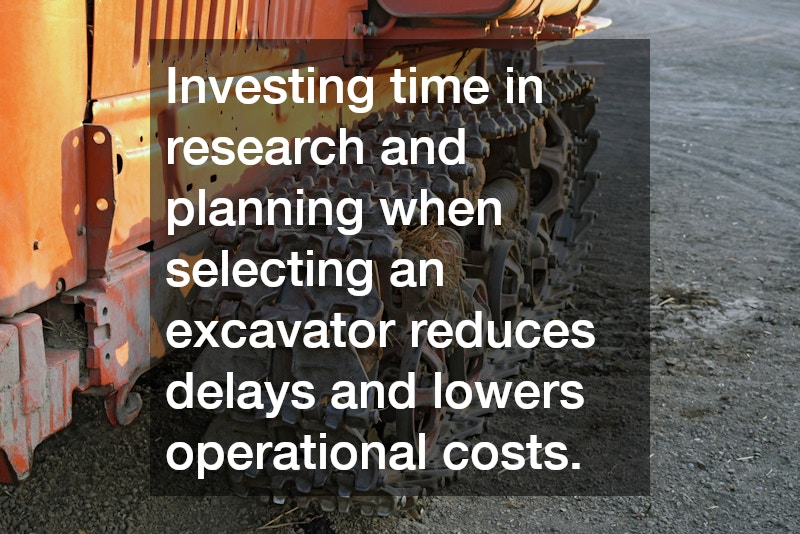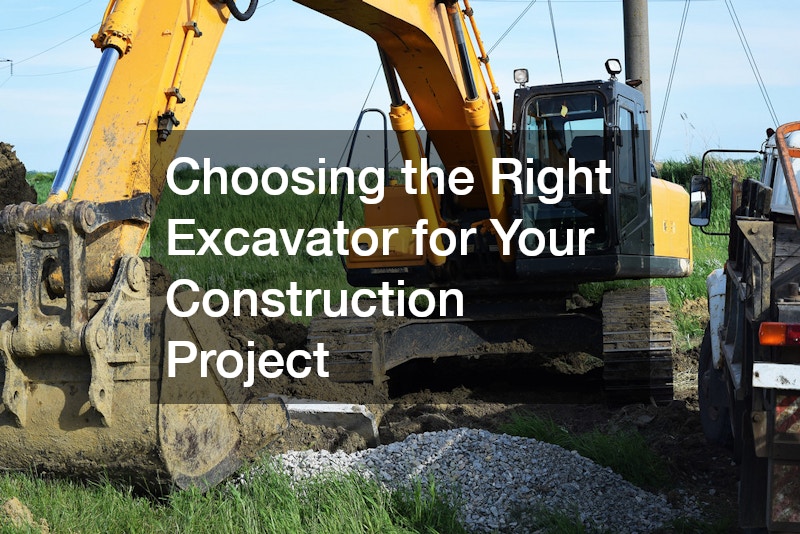Selecting the right machinery is a critical step in any construction project, and choosing the right excavator can make a significant difference in efficiency, safety, and overall project outcomes. Excavators are versatile machines used for digging, demolition, landscaping, and site preparation.
Understanding the key considerations when selecting an excavator ensures your project runs smoothly and meets its deadlines.
Understanding Different Excavator Types
Excavators come in various types and sizes, each suited to specific tasks. For small residential projects, compact or mini excavators offer manoeuvrability and precision in confined spaces. These machines are ideal for trenching, landscaping or small-scale demolition. On the other hand, standard and large excavators provide the power and reach needed for extensive earthworks and heavy-duty construction projects.
Knowing the right type of excavator for your project saves time and reduces the risk of using underpowered or unsuitable equipment. Assessing the project requirements, site conditions, and available space helps you make an informed choice. For Australian construction sites, it is essential to consider soil type, weather conditions, and access limitations when evaluating excavator options.
Key Features to Consider in an Excavator
When choosing an excavator, several features directly impact performance and efficiency. Engine power, hydraulic capabilities, and bucket capacity are essential for handling different types of materials and workloads. Tracks or wheels also influence the machine’s stability and mobility. Tracked excavators offer superior stability on uneven terrain, while wheeled models provide greater speed and easier movement on paved surfaces.
Modern excavators also offer advanced technology such as GPS guidance, load monitoring, and automated controls. These features improve accuracy, reduce fuel consumption, and enhance operator safety. Investing in an excavator with suitable features ensures the machine can handle all aspects of your construction project efficiently while minimising downtime and operational costs.
Maintenance and Operator Training
Proper maintenance and operator training are crucial factors in maximising the lifespan and effectiveness of an excavator. Regular servicing, oil changes, and inspection of hydraulic systems prevent breakdowns and reduce repair costs. A well-maintained machine operates more reliably, keeping your project on schedule.
Operator training is equally important. Skilled operators can handle the excavator safely, avoid accidents, and optimise the machine’s capabilities. Many Australian construction companies provide specialised training programs to ensure operators are proficient in handling various excavator models. Selecting a machine that is easy to maintain and operate adds significant value to your project and enhances safety on-site.
Assessing Project Requirements and Budget
Choosing the right excavator also involves careful consideration of your project’s scope and budget. Overestimating your needs may lead to unnecessary costs, while underestimating can cause delays and inefficiency. Calculating the required digging depth, material volume, and operational hours helps determine the ideal excavator size.
Budgeting for both the initial purchase or hire and ongoing operating costs is essential. Hiring an excavator for short-term projects is often more cost-effective than purchasing, especially if specialised features are only needed temporarily. Australian construction businesses frequently weigh the benefits of hiring versus owning to achieve the best balance between cost and performance.
Safety and Site Compliance
Excavators operate in potentially hazardous environments, making safety a top priority. Australian construction regulations require machines to meet strict safety standards, including rollover protection, secure cabins, and audible alarms. Choosing an excavator that complies with these regulations reduces the risk of workplace accidents and ensures legal compliance.
Site-specific considerations, such as underground utilities, nearby structures, and pedestrian access, also influence the choice of excavator. Ensuring that the machine can operate safely in these conditions protects workers and minimises the potential for damage or disruption on-site. Safety-conscious decisions contribute to smooth project execution and a positive reputation for your construction team.
Choosing the right excavator is more than just selecting a machine; it is a strategic decision that affects the efficiency, safety, and success of your construction project. Considering factors such as machine type, key features, maintenance, operator training, project requirements, and safety ensures you select an excavator that meets your needs and Australian site conditions.
Investing time in research and planning when selecting an excavator reduces delays, lowers operational costs, and enhances overall project outcomes. Whether you are handling small residential jobs or large commercial developments, the right excavator is a valuable tool that supports productivity and safety on every site. By focusing on these considerations, Australian construction professionals can maximise the benefits of their machinery and ensure successful project completion.

